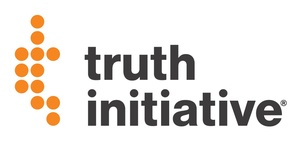WASHINGTON, June 14, 2017 /PRNewswire-USNewswire/ -- It is not an accident that smoking rates among lesbian, gay, bisexual and transgender youth are twice the rate for the general population. For decades, African Americans, low-income neighborhoods, LGBTQ communities and those with mental illness have been disproportionally profiled by the tobacco industry with aggressive advertising and promotional efforts.
Tobacco is not just a public health issue, it's a social justice issue. Earlier this year, truth, one of the most successful and one of the largest national youth tobacco prevention campaigns run by the non-profit Truth Initiative, launched the #STOPPROFILING campaign as a way to shine a light on how the tobacco industry deliberately singles out the very communities that already face adversity and inequality with aggressive and unfair profiling tactics.
For years the tobacco industry has made efforts to appeal to LGBT consumers through things like targeted advertisements in LGBT press, cigarette giveaways and free tobacco industry merchandise. Today, the LGBT community is among the hardest hit by tobacco.
Smoking rates in the LGBT community
According to a 2011 Institute of Medicine (IOM) report, researchers "face a number of challenges in understanding the health needs of LGBT populations." There are limited national data available regarding tobacco use among the LGBT community. Data that are available, however, indicate that the LGBT community is disproportionately impacted by tobacco:
- Overall, 20.6 percent of LGB adults smoke cigarettes compared to 14.9 percent of straight adults. For transgender adults, very little information exists on cigarette smoking rates—but this population is considered especially vulnerable.
- Only 11.8 percent of heterosexual young adults indicate that they currently smoke cigarettes, compared to 19 percent of homosexual, 16.9 percent of bisexual and 33.2 percent of transgender young adults.
- Bisexual women are up to 3.5 times more likely to smoke, try their first cigarette at a lower age and have a higher nicotine dependence than heterosexual women.
- LGBT smokers are significantly more likely to smoke menthol cigarettes: more than 36 percent of LGBT smokers report that they usually smoke menthols, which are easier to use and harder to quit.
- The prevalence of smoking other types of tobacco, including water pipes and cigar, cigarillo, or small cigars, is higher for LGBT adults compared to heterosexual adults.
Even though youth smoking rates overall are down to 6 percent, smoking rates among LGB youth are estimated to be considerably higher than those among youth in general, based on an analysis of data from 1987 to 2000. More than twice as many LGB students in grades nine through 12 have smoked a cigarette before the age of 13, compared to their heterosexual peers. LGB students also smoke more frequently. Digging even deeper, lesbian and bisexual girls are 9.7 times more likely to smoke cigarettes regularly, compared to their heterosexual peers.
Big Tobacco's Long History of Targeting the LGBT Community
The tobacco industry has targeted the LGBT community since at least 1991, when tobacco company Philip Morris settled a boycott by pledging large donations to AIDS research and programs. The boycott, led by the AIDS Coalition to Unleash Power, protested the company's support of Senator Jesse Helms (R-North Carolina), a leading opponent of AIDS funding and LGBT civil rights. Using corporate philanthropy as evidence of its support of the LGBT community, Philip Morris quickly gained access to the market, leading the way for other tobacco companies to follow suit.
Tobacco companies also began to advertise in "gay press" publications in the early 1990s, often depicting tobacco use as a "normal" part of LGBT life. Many ads for products other than cigarettes glamorized smoking, and many articles having nothing to do with smoking were shown with tobacco images.
This isn't the first time that truth has called attention to the profiling tactics of the tobacco industry. In 2008 and 2013, truth exposed "Project SCUM" (Sub-Culture Urban Marketing) a 1995 R.J. Reynolds marketing campaign which targeted LGBT and homeless people to boost cigarette sales. On top of donations, giveaways and increased advertising, the tobacco industry made community outreach efforts such as hosting local promotions like "LGBT bar nights" featuring specific cigarette brands.
#STOPPROFILING comes at a time when people across the country are using their voice as a generation to evoke real change in the world and lead the fight against inequality and injustice worldwide. truth is sending a loud and clear message and asking for others to do join us and do the same by becoming citizen journalists, and call out tobacco profiling wherever and whenever they see it and be the generation that ends tobacco for good.
truth gives teens facts to make their own informed choices about tobacco use and inspires them to use their social influence and creativity in the fight against tobacco. The campaign is credited with preventing hundreds of thousands of teens from starting to smoke, and is working to make this the generation that ends smoking for good. truth is part of Truth Initiative, a national public health organization dedicated to achieving a culture where all youth and young adults reject tobacco.
About Truth Initiative
Truth Initiative is a national public health organization that is inspiring tobacco-free lives and building a culture where all youth and young adults reject tobacco. The truth about tobacco and the tobacco industry are at the heart of our proven-effective and nationally recognized truth® public education campaign, our rigorous and scientific research and policy studies, and our innovative community and youth engagement programs supporting populations at high risk of using tobacco. The Washington D.C.-based organization, formerly known as Legacy, was established and funded through the 1998 Master Settlement Agreement between attorneys general from 46 states, five U.S. territories and the tobacco industry. To learn more about our work speaking, seeking and spreading the truth about tobacco, visit truthinitiative.org.
SOURCE Truth Initiative
Related Links
http://www.truthinitiative.org
WANT YOUR COMPANY'S NEWS FEATURED ON PRNEWSWIRE.COM?
Newsrooms &
Influencers
Digital Media
Outlets
Journalists
Opted In





Share this article